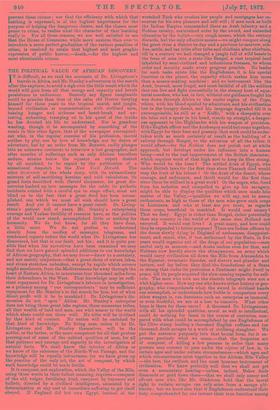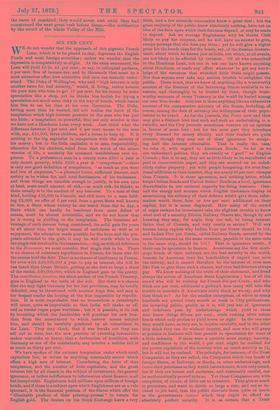THE POLITICAL VALUE OF AFRICAN DISCOVERY.
IT is difficult, as we read the accounts of Dr. Livingstone's
travels in Africa, and Mr. Stanley's adventures in the search after the explorer, to avoid a sigh over the little result which the world will gain from all that energy and capacity and heroic persistence in endeavour. Scarcely any figure imaginable could be grander than that of the calm old Doctor burying himself for three years in the tropical marsh and jungle, beyond civilisation or communication with civilised men, bearing hunger and sickness and heart-break, and un- resting, unhasting, tramping on in his quest of the truths he has devoted his life to understand. Nor is grandeur wanting, though it be accompanied by something of the comic in this other figure, that of the newspaper correspond- ent who, in the regular exercise of his profession, moved neither by pity, nor by love of knowledge, nor by desire of adventure, but by an order from Mr. Bennett, coolly plunges into an unknown continent to interview a lost geographer, and after months of sufferings such as only African travellers endure, attains below the equator an object desired by all mankind, to be repaid by the publication of a
sensational despatch to the New York Herald. The utter bizarrerie of the whole story, with its extraordinary mixture of self-sacrificing heroism and cold calculation, its grand feats described with Herald eloquence, its great dis- coveries hashed up into messages for the cable, its pathetic incidents related with a careful eye to stage effect, must not blind us to the fact that a great deed has been accom- plished, one which we must all wish should have a great result. And yet it cannot have a great result. Dr. Living- stone'e patient toil of years, Mr. Stanley's enterprising eourage and Yankee fertility of resource have, as the politics of the world now stand, accomplished little or nothing for humanity. We do but know, for all they have done, a little more. We do not profess to understand clearly from the medley of messages, telegrams, and condensed reports before the world what Dr. Livingstone has discovered, but that is our fault, not his ; and it is quite pos- sible that when his narratives have been examined we may find that we have gained splendid additions to our knowledge of African geography, that we may know—know to a certainty, and not merely conjecture—that a great chain of waters, lakes, and rivers stretches unbroken, except by rapids which science might ameliorate, from the Mediterranean far away through the heart of Eastern Africa, to mountains four thousand miles from their debouchure in the West. That knowledge may be suffi- cient repayment for Dr. Livingstone's labours in investigation, as a primacy among " our correspondents " may be sufficient repayment for Mr. Stanley's in the search for him, but of what direct profit will it be to mankind ? Dr. Livingstone's dis- coveries do not " open " Africa. Mr. Stanley's enterprise does not bring those great lake regions, those numerous tribes, all that wealth of land and men, one whit nearer to the world which alone could use them well. No tribe will be civilised by that kind of contact. No nation will be enriched by that kind of knowledge. No living man, unless it be Dr. Livingstone and Mr. Stanley themselves, will be the nobler, or the better, or the more competent for all that profuse pouring-out of some of the noblest qualities of men, for all that patience and courage and sagacity in the investigation of natural facts. We shall know the interior of Africa as we know of the existence of the North-West Passage, and the knowledge will be equally infructuous, for we have given up the practice of the only art, the art of conquest, by which ouch knowledge could be made fertile.
It is conquest, not exploration, which the Valley of the Nile, using those words in their fullest meaning, requires—conquest of the old, vulgar, fertilising kind, conquest by bayonets and bullets, directed by a civilised intelligence, animated by a determination at any cost of immediate suffering to get itself obeyed. If England did but own Egypt, instead of the
wretched Turk who crushes her people and mortgages her re- sources for his own pleasure and self-will ; if men such as built the Indian Empire commanded there an Arab infantry and a Nubian cavalry, maintained order by the sword, and extended education by the bullet—very rough means, which the century discards, but the only effective means—we might conquer along the great river a district to-day and a province to-morrow, sub- due, settle, and tax tribe after tribe and chieftain after chieftain, till in a century we had changed a jungle full of wild beasts in the form of men into a state like Bengal, a vast tropical land inhabited by semi-civilized and industrious freemen, to whom order and security made every progress possible. No leader for such tasks exists like the Englishman, it is his special function in the planet, the capacity which makes him more than a money-making machine ; and no instrument like the Arab, bravest, most frugal, and most faithful of all the soldiers that can live and fight successfully in the steamy heat of equa- torial marshes, who has, in fact, without our guidance fought his way down through Africa to the cooler region of the Cape, where, with his blood spoiled by admixture, and his civilisation lost in the hungry desert, and his language degraded till it is unrecognisable, he still as a " Kaffir," with a sheepskin over his loins and a spear in his hand, stands up straight, a danger- ous opponent to the Highlander with his weapon of precision. If the English officer and the Arab sepoy could but come together, with Egypt for their base and granary, that work could be under- taken with as much certainty of result as the building of a railway through Bengal, to the salvation of all the tribes it would affect—for the Nubian does not perish out at white approach, but develops under his influence into a human being—and to the vast improvement of the British character, which requires work of that high sort to keep its fibre strong. Who would be the loser ? The settled Arab of Egypt, who under British laws for the first time since Pharaoh died would reap the fruit of his labour ? Or the Arab of the desert, whose courage, and endurance, and thrift would for the first time since Omar be utilised in a great work? Or the negro, who, freed from his isolation and compelled to give up his savagery, might be able to display the qualities which once made him master of the Valley,—qualities we will say, not to annoy enthusiasts, as high as those of the men who grow such crops in Louisiana, and who at least are pro Canto, as regards those crops, beneficial to mankind. It would cost money ? That we deny. Egypt is richer than Bengal, richer potentially than any country in the world of the same size, Holland not excepted. It would cost lives ? A great many, and how could they be expended to better purpose? There are Indian officers by the dozen slowly dying in England of uselessness, disappoint- ment, and ennui, who, if but authorised by the State, in five years would organise out of the dregs of our population—men useful only as manure,—and Arabs useless even for that, and Nubians now hardly above the chimpanzees, an army which would carry civilisation all down the Nile from Alexandria to the Equator, terminate disorder, end slavery and plunder and torture, and lay before they died the foundations of a State so strong that under its protection a Continent might dwell in peace, till its people acquired the slow-coming capacity for self- rule. The men who now use the electric telegraph were not a whit higher once. How any one who knows either history or geo- graphy, who comprehends what the sword in civilised hands can accomplish, or understands how feeble in comparison every other weapon is, can denounce such an enterprise as immoral, or even doubtful, we are at a loss to conceive. What other hope is there for those races ? A thousand Dr. Livingstones, with all his splendid qualities, moral as well as intellectual, could do nothing for them in the course of centuries, com- pared with what could be accomplished by one Englishman of the Clive stamp leading a thousand English ruffians and ten thousand Arab savages to a work of civilising slaughter. We put the sentence purposely into that brutal form, for it ex- presses precisely what we mean,—that the forgotten art of conquest, of killing a few persons in order that many persons may consent to pass under the regime of law, is, in certain ages and under certain circumstances—which ages and which circumstances exist together in the African Nile Valley —the best, the swiftest, and the most humane instrument of civilisation. We know perfectly well that we shall not get even a momentary hearing—unless, indeed, Baker finds diamonds or gold down there—that we shall only annoy and affront men who, like Mr. Gladstone, hold that the moral right to reclaim savages can only arise from a savage ple- biscite ; but we know also that if Englishmen understood their duty, comprehended for one instant their true function among
the races of mankind, they would never rest until they had commenced the next great task before them,—the civilisation by the sword of the whole Valley of the Nile.



































 Previous page
Previous page